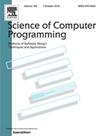An exploratory study on the usage of quantum programming languages
IF 1.4
4区 计算机科学
Q3 COMPUTER SCIENCE, SOFTWARE ENGINEERING
引用次数: 0
Abstract
As in the classical computing realm, quantum programming languages in quantum computing allow one to instruct a quantum computer to perform certain tasks. In the last 25 years, many imperative, functional, and multi-paradigm quantum programming languages with different features and goals have been developed. However, to the best of our knowledge, no study has investigated who uses quantum languages, how practitioners learn a quantum language, how experience are practitioners with quantum languages, what is the most used quantum languages, in which context practitioners use quantum languages, what are the challenges faced by quantum practitioners while using quantum languages, are program written with quantum languages tested, and what are quantum practitioners' perspectives on the variety of quantum languages and the potential need for new languages. In this paper, we first conduct a systematic survey to find and collect all quantum languages proposed in the literature and/or by organizations. Secondly, we identify and describe 37 quantum languages. Thirdly, we survey 251 quantum practitioners to answer several research questions about their quantum language usage. Fourthly, we conclude that (i) 58.2% of all practitioners are 25–44 years old, 63.0% have a master's or doctoral degree, and 86.2% have more than five years of experience using classical languages. (ii) 60.6% of practitioners learn quantum languages from the official documentation. (iii) Only 16.3% of practitioners have more than five years of experience with quantum languages. (iv) Qiskit (Python) is the most used quantum language, followed by Cirq (Python) and QDK (Q#). (v) 42.8% use quantum languages for research. (vi) Lack of documentation and usage examples are practitioners' most challenging issues. Practitioners prefer open-source quantum languages with an easy-to-learn syntax (e.g., based on an existing classical language), available documentation and examples, and an active community. (vii) 76.4% of all participants test their quantum programs, and 42.6% test them automatically. (viii) A standard quantum language, perhaps high-level language, for quantum computation could accelerate the development of quantum programs. Finally, we present a set of suggestions for developers and researchers on the development of new quantum languages or enhancement of existing ones.
关于量子编程语言使用情况的探索性研究
与经典计算领域一样,量子计算中的量子编程语言允许人们指示量子计算机执行某些任务。在过去 25 年中,许多具有不同功能和目标的命令式、函数式和多范式量子编程语言相继问世。然而,据我们所知,还没有研究调查过谁在使用量子语言,从业人员如何学习量子语言,从业人员对量子语言的经验如何,最常用的量子语言是什么,从业人员在什么情况下使用量子语言,量子从业人员在使用量子语言时面临哪些挑战,用量子语言编写的程序是否经过测试,以及量子从业人员对量子语言多样性的看法和对新语言的潜在需求。在本文中,我们首先进行了一次系统调查,查找并收集了文献和/或组织提出的所有量子语言。其次,我们确定并描述了 37 种量子语言。第三,我们调查了 251 位量子实践者,回答了有关他们使用量子语言的几个研究问题。第四,我们得出以下结论:(i) 58.2%的从业者年龄在 25-44 岁之间,63.0%的从业者拥有硕士或博士学位,86.2%的从业者拥有五年以上使用经典语言的经验。(ii) 60.6%的从业人员从官方文件中学习量子语言。(iii) 只有 16.3% 的从业人员有五年以上使用量子语言的经验。(iv) Qiskit(Python)是使用最多的量子语言,其次是 Cirq(Python)和 QDK(Q#)。(v) 42.8%的人使用量子语言进行研究。(vi) 缺乏文档和使用实例是从业人员面临的最大挑战。从业人员更青睐语法简单易学(如基于现有经典语言)、文档和示例齐备、社区活跃的开源量子语言。(vii) 76.4% 的参与者测试了他们的量子程序,42.6% 的参与者自动测试了这些程序。(viii) 用于量子计算的标准量子语言,也许是高级语言,可以加速量子程序的开发。最后,我们向开发人员和研究人员提出了一系列开发新量子语言或改进现有语言的建议。
本文章由计算机程序翻译,如有差异,请以英文原文为准。
求助全文
约1分钟内获得全文
求助全文
来源期刊

Science of Computer Programming
工程技术-计算机:软件工程
CiteScore
3.80
自引率
0.00%
发文量
76
审稿时长
67 days
期刊介绍:
Science of Computer Programming is dedicated to the distribution of research results in the areas of software systems development, use and maintenance, including the software aspects of hardware design.
The journal has a wide scope ranging from the many facets of methodological foundations to the details of technical issues andthe aspects of industrial practice.
The subjects of interest to SCP cover the entire spectrum of methods for the entire life cycle of software systems, including
• Requirements, specification, design, validation, verification, coding, testing, maintenance, metrics and renovation of software;
• Design, implementation and evaluation of programming languages;
• Programming environments, development tools, visualisation and animation;
• Management of the development process;
• Human factors in software, software for social interaction, software for social computing;
• Cyber physical systems, and software for the interaction between the physical and the machine;
• Software aspects of infrastructure services, system administration, and network management.
 求助内容:
求助内容: 应助结果提醒方式:
应助结果提醒方式:


